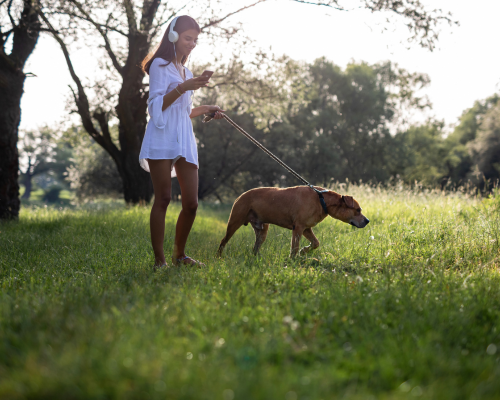Can Dogs Use Tampons? All You Need To Know!
Can Dogs Use Tampons? All You Need To Know!


By: Sarah Hodgson
December 3, 2023
Click To Skip Ahead
All female dogs go in heat and if you're female dog is currently in heat you might be wondering if your dog can use tampons.
While the idea may seem unusual, it's important to know the facts to provide the best care for your canine companion. In this article, we will explore the subject of dogs and tampons and go over all you need to know.
So let's dive in!
How Do You Know If Your Dog Is Having Her Period?
Just like humans, female dogs experience a reproductive cycle known as estrus better known as heat. During this time, they exhibit various physical and behavioral changes.
1. Swelling and discharge: One of the first signs of a dog in heat is swelling of the vulva. Additionally, you may notice a bloody discharge, which can vary in color and consistency.
2. Frequent urination and marking: Dogs in heat may urinate more frequently and exhibit marking behavior to attract potential mates.
3. Changes in behavior: Female dogs in heat may become more restless, agitated, or clingy. They may also display increased flirtatious behavior towards male dogs.
Note
Each dog's heat cycle may vary in duration and intensity. While some dogs go through this phase every six months, others may have irregular or longer cycles. Monitoring your dog's behavior and consulting with a veterinarian can help you determine if she is in heat.

Is There Such A Thing As Dog Tampons?
While there isn't a product specifically called "dog tampons," there are sanitary products designed for female dogs in heat. These products are often referred to as dog diapers, doggie diapers, or sanitary pants. They serve a similar purpose to human sanitary products, helping to manage and contain a female dog's menstrual flow during her heat cycle.
Dog diapers come in various sizes and designs, and they are typically reusable and washable. They can be a practical solution for dog owners who want to prevent their female dogs from staining furniture, carpets, or other areas during their heat cycle.
Can You Put a Tampon In a Dog?
Now for the main question can you put a tampon in a dog?
No, you should never attempt to put a tampon in a dog. Dogs have a different anatomy than humans, and tampons are not designed to fit or function in their bodies. Trying to insert a tampon into a dog can cause harm, discomfort, and potentially lead to serious health issues.
If you notice your dog is experiencing heavy bleeding or discomfort during her heat cycle, it is crucial to consult with a veterinarian for appropriate guidance and treatment options.
Can You Use Human Pads For Dogs?
While using human pads might seem like a convenient solution, perhaps an alternative to tampons, human pads are also not advisable to put in dogs.
Human pads are not designed to adhere to a dog's fur and can easily become displaced or cause irritation. Moreover, they may not provide adequate absorbency for a dog's bleeding. Instead, consider using specially-made dog diapers or sanitary pants designed to accommodate the unique needs of female dogs during their heat cycle. These products are designed to stay in place and provide comfort without causing any harm.

Why are Tampons Dangerous for Dogs?
Tampons pose several risks to dogs. Firstly, the materials used in tampons can be harmful if ingested. If your dog manages to chew and swallow a tampon, it can cause blockages in the digestive system, leading to serious health issues. Secondly, the string attached to tampons can be a choking hazard if your dog tries to swallow it. Lastly, the insertion of a tampon into a dog's vaginal canal can cause irritation, discomfort, and potential injury. It's crucial to keep tampons out of your dog's reach and seek appropriate alternatives for managing her heat cycle.
What You Should Know About Tampons and Dogs?
Understanding the potential dangers of tampons is essential for responsible dog owners. Dogs are naturally curious creatures and may be attracted to the scent or texture of tampons.
1. Keep tampons out of reach: Store your tampons in a secure location where your dog cannot access them. Consider using a lidded trash can or keeping them in a bathroom cabinet.
2. Proper disposal: When disposing of used tampons, make sure to do so in a way that prevents your dog from getting hold of them. Wrap them securely in tissue or toilet paper before disposing of them in a sealed trash bag.
3. Pet-proof your surroundings: Ensure that your living space is free from any potential hazards for your dog. Keep your bathroom doors closed, and regularly inspect the area for any items that may be within your dog's reach.
4. Consult your veterinarian: If your dog ingests a tampon or exhibits any signs of discomfort or illness, contact your veterinarian immediately. They can provide guidance on the best course of action and any necessary treatment.
What To Do If Your Dog Ate a Tampon
If you discover that your dog has ingested a tampon, it's important to act promptly. Contact your veterinarian immediately and provide them with all the necessary information while doing this stay calm as overreacting won't help the situation.
They may recommend inducing vomiting or other appropriate actions depending on the size of your dog and the potential risks involved. Never attempt to induce vomiting without the guidance of a professional. Your veterinarian will be able to assess the situation and provide the best course of action for your dog's specific needs.

The Bottom Line
So there you have it, it is not safe or advisable to use tampons for dogs. Dogs have different anatomies and reproductive systems than humans, making tampons unsuitable and potentially harmful. Instead, consider using specially designed dog diapers or sanitary pants that cater to your dog's unique needs during her heat cycle. Always prioritize your dog's health and well-being by keeping tampons out of reach and promptly seeking veterinary guidance if your dog ingests a tampon.
Remember, your veterinarian is your best resource for any concerns or questions regarding your dog's health and well-being.

Subscribe to Petfluence!
Get updates on the latest posts and more from Petfluence straight to your inbox.